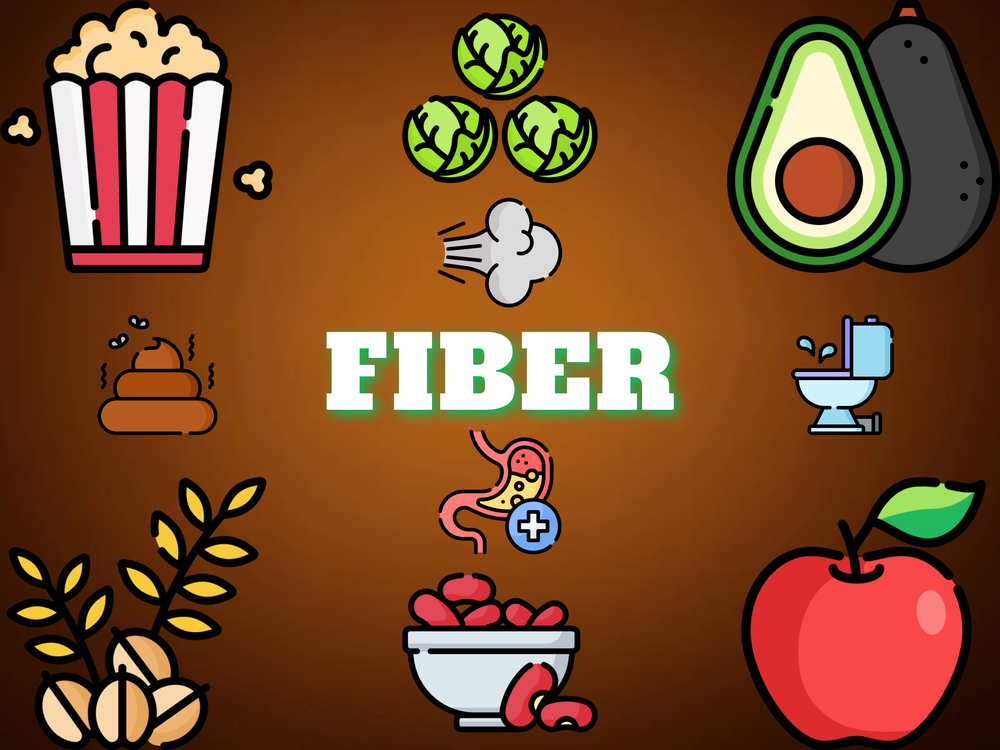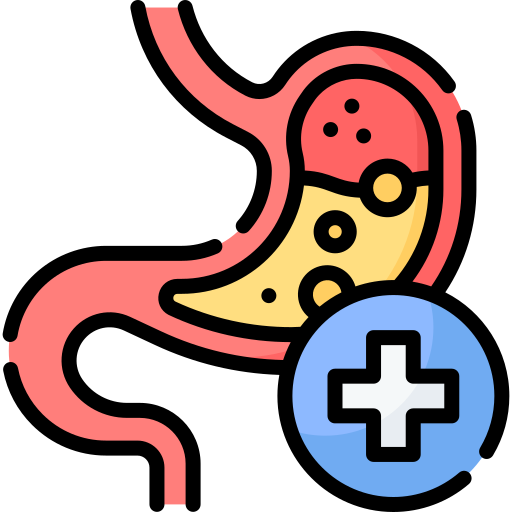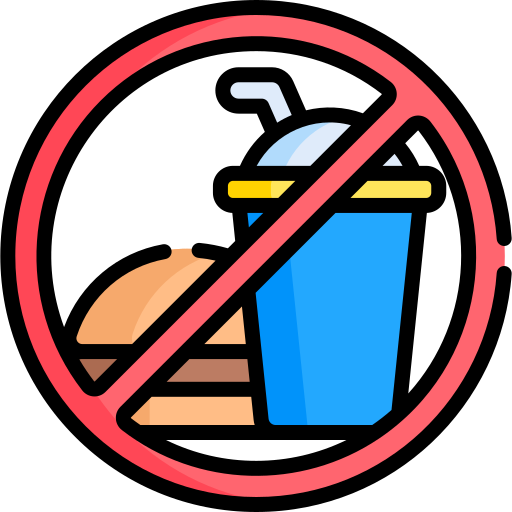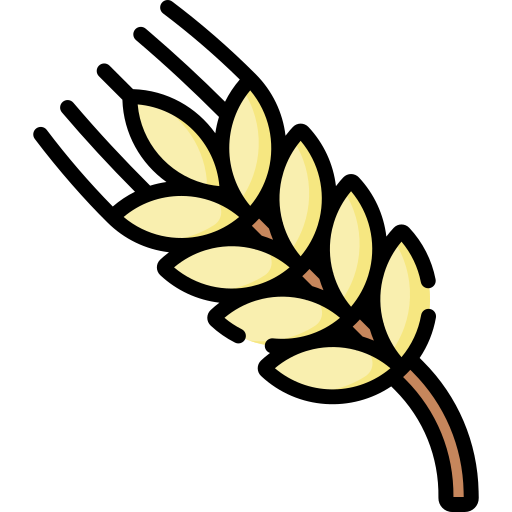
Introduction
Fiber is a type of undigestible carbohydrate, meaning it doesn't get broken down into glucose (meaning it has no calories). This is the difference between total carbs and net carbs; you subtract out the fiber. Fiber is essential for optimal digestive and colon health, keeping you regular and making you feel full. This is why high fiber consumption is good for weight management; fiber fills you up, causing you to eat less. Fiber also slows the absorption of sugar, leading to less blood sugar spikes.
You want to consume enough fiber for proper health, but it's best to increase your consumption slowly to prevent bloating and gas. This includes both soluble and insoluble fiber, which hare discussed below. Both are necessary, and the best way to ensure you're consuming enough is to have a wide variety of plant-based foods.


High Fiber Foods

Soluble Fiber
Fiber is made up of soluble and insoluble fiber. Soluble fiber, also known as fermentable or "globular" fiber, dissolves in water, and is found in oats, beans, and fruits. As it dissolves in water, soluble fiber forms a gel-like substance in your digestive track, slowing digestion. This helps regulate your blood sugar levels, as well as help you feel full for longer after eating. Additionally, soluble fiber is a prebiotic, supporting the growth of good bacteria and preventing leaky gut. Soluble fiber consumption has also been linked to reduced LDL cholesterol. The following are all good sources of soluble fiber:
Beans: black, chickpeas, kidney, pinto
Fruit: apples, avocado, berries, melon, oranges
Psyllium husks
Vegetables: artichokes, beets, carrots, peas
Whole grains: barley, oats


Insoluble Fiber
On the other hand, insoluble fiber, also known as non-fermentable or "stringy" fiber, does not dissolve in water, and is found in nuts, whole grains, and vegetables. As it doesn't mix with water, insoluble fiber provides bulk to your stool, making it easier for food to pass through your digestive system. Insoluble fiber is the fiber you think of when you think of pooping. Like soluble fiber, insoluble fiber also helps in keeping you full and mainting a healthy gut microbiome. The following are all good sources of insoluble fiber:
Beans: black, chickpeas, kidney, pinto
Leafy vegetables: broccoli, cauliflower, kale, spinach
Nuts: almonds, pecans, pistachios, walnuts
Seeds: flax seeds, chia seeds, sesame seeds
Starchy vegetables: potatoes, squash, sweet potatoes
Whole grains: brown rice, quinoa, whole wheat flour


Benefits of Fiber
Soluble and insoluble fiber work together in your body. Here's a metaphor from endocrinologist Dr. Robert Lustig. Take a strainer and rub it with petrolleum jelly. You won't be able to drain out water anymore. The strainer is the insoluble fiber, and the petrolleum jelly is the soluble fiber. The combination of both slows the absorption of food in your digestive system, keeping you full. Below are just some of the many benefits of high fiber consumption:
Blood sugar control
Boost brain and immune function
Digestive health
Increased satiety (fullness)
Lower blood pressure
Lower cholesterol
Lower risk of breast and colon cancer
Lower risk of diabetes
Reduce inflammation
Regulate bowel movements
Weight management


Symptoms of Low Fiber Intake
Acne
Bloating
Constipation
Diabetes
Fatigue
Gas
High blood pressure
High blood sugar
High cholesterol
IBS
Irregular bowel movements
Weight gain


Daily Consumption
Men: 38 grams
Women: 25 grams


Foods High In Fiber
Beans (dried)

Vegetables (Raw)

Fruit

Nuts

Seeds

Grains (Raw)

Other

Best Sources of Fiber
Per serving: Chia Seeds - 9.6 g (1 oz, 28 g)
Per 100 g: Cocoa Powder - 37.0 g
Per 100 cal: Cocoa Powder - 16.2 g
References
1. FlatIcon
2. Nutrition Value
3. The True Nutrients - Fiber
4. What’s the Difference Between Soluble and Insoluble Fiber?
5. ChatGPT
6. Another Note on Fiber
This post may contain affiliate links
Fiber is a type of undigestible carbohydrate, meaning it doesn't get broken down into glucose (meaning it has no calories). This is the difference between total carbs and net carbs; you subtract out the fiber. Fiber is essential for optimal digestive and colon health, keeping you regular and making you feel full. This is why high fiber consumption is good for weight management; fiber fills you up, causing you to eat less. Fiber also slows the absorption of sugar, leading to less blood sugar spikes.
You want to consume enough fiber for proper health, but it's best to increase your consumption slowly to prevent bloating and gas. This includes both soluble and insoluble fiber, which hare discussed below. Both are necessary, and the best way to ensure you're consuming enough is to have a wide variety of plant-based foods.


High Fiber Foods

Soluble Fiber
Fiber is made up of soluble and insoluble fiber. Soluble fiber, also known as fermentable or "globular" fiber, dissolves in water, and is found in oats, beans, and fruits. As it dissolves in water, soluble fiber forms a gel-like substance in your digestive track, slowing digestion. This helps regulate your blood sugar levels, as well as help you feel full for longer after eating. Additionally, soluble fiber is a prebiotic, supporting the growth of good bacteria and preventing leaky gut. Soluble fiber consumption has also been linked to reduced LDL cholesterol. The following are all good sources of soluble fiber:


Insoluble Fiber
On the other hand, insoluble fiber, also known as non-fermentable or "stringy" fiber, does not dissolve in water, and is found in nuts, whole grains, and vegetables. As it doesn't mix with water, insoluble fiber provides bulk to your stool, making it easier for food to pass through your digestive system. Insoluble fiber is the fiber you think of when you think of pooping. Like soluble fiber, insoluble fiber also helps in keeping you full and mainting a healthy gut microbiome. The following are all good sources of insoluble fiber:


Benefits of Fiber
Soluble and insoluble fiber work together in your body. Here's a metaphor from endocrinologist Dr. Robert Lustig. Take a strainer and rub it with petrolleum jelly. You won't be able to drain out water anymore. The strainer is the insoluble fiber, and the petrolleum jelly is the soluble fiber. The combination of both slows the absorption of food in your digestive system, keeping you full. Below are just some of the many benefits of high fiber consumption:


Symptoms of Low Fiber Intake


Daily Consumption


Foods High In Fiber
| Food | Serving Size | Fiber Per Serving |
Fiber Per 100 g |
Fiber Per 100 cal |
|---|---|---|---|---|
| Black Beans | 1/4 cup (50 g) |
7.8 g (28 %) |
15.5 g (55 %) |
4.5 g (16 %) |
| Chickpeas | 1/4 cup (50 g) |
6.1 g (22 %) |
12.2 g (44 %) |
3.2 g (12 %) |
| Edamame (Frozen) |
3/4 cup (85 g) |
4.1 g (14 %) |
4.8 g (17 %) |
4.4 g (16 %) |
| Green Lentils | 1/4 cup (50 g) |
5.4 g (19 %) |
10.7 g (38 %) |
3.0 g (11 %) |
| Kidney Beans | 1/4 cup (50 g) |
7.6 g (27 %) |
15.2 g (54 %) |
4.5 g (16 %) |
| Lima Beans | 1/4 cup (50 g) |
9.5 g (34 %) |
19.0 g (68 %) |
5.6 g (20 %) |
| Navy Beans | 1/4 cup (50 g) |
7.7 g (28 %) |
15.3 g (55 %) |
4.5 g (16 %) |
| Pinto Beans | 1/4 cup (50 g) |
7.8 g (28 %) |
15.5 g (55 %) |
4.5 g (16 %) |
| Red Lentils | 1/4 cup (50 g) |
5.4 g (20 %) |
10.8 g (39 %) |
3.0 g (11 %) |
| Soybeans | 1/4 cup (50 g) |
4.7 g (17 %) |
9.3 g (33 %) |
2.1 g (7 %) |
| Tofu | 3 oz (85 g) |
0.3 g (1 %) |
0.3 g (1 %) |
0.4 g (1 %) |

Vegetables (Raw)
| Food | Serving Size | Fiber Per Serving |
Fiber Per 100 g |
Fiber Per 100 cal |
|---|---|---|---|---|
| Artichoke | 1 cup (150 g) |
8.6 g (30 %) |
5.7 g (20 %) |
10.8 g (38 %) |
| Arugula | 1 cup (20 g) |
0.3 g (1 %) |
1.6 g (6 %) |
6.4 g (24 %) |
| Asparagus | 1 cup (134 g) |
2.8 g (11 %) |
2.1 g (8 %) |
10.5 g (40 %) |
| Beet | 1 cup (136 g) |
3.8 g (14 %) |
2.8 g (10 %) |
6.5 g (23 %) |
| Beet Greens | 1 cup (38 g) |
1.4 g (5 %) |
3.7 g (13 %) |
16.8 g (59 %) |
| Bell Pepper | 1 medium (119 g) |
2.5 g (10 %) |
2.1 g (8 %) |
8.1 g (31 %) |
| Broccoli | 1 cup (91 g) |
2.4 g (8 %) |
2.6 g (9 %) |
7.6 g (26 %) |
| Brussel Sprout | 1 cup (88 g) |
3.3 g (12 %) |
3.8 g (14 %) |
8.8 g (33 %) |
| Butternut Squash | 1 cup (140 g) |
2.8 g (10 %) |
2.0 g (7 %) |
4.4 g (16 %) |
| Cabbage | 1 cup (89 g) |
2.2 g (8 %) |
2.5 g (9 %) |
10.0 g (36 %) |
| Carrot | 3 oz (85 g) |
2.4 g (9 %) |
2.8 g (10 %) |
6.8 g (24 %) |
| Cauliflower | 1 cup (107 g) |
2.1 g (7 %) |
2.0 g (7 %) |
8.0 g (28 %) |
| Collard Green | 1 cup (36 g) |
1.4 g (5 %) |
4.0 g (14 %) |
12.5 g (44 %) |
| Kale | 1 cup (21 g) |
0.9 g (3 %) |
4.1 g (15 %) |
11.7 g (43 %) |
| Parsnip | 1 cup (133 g) |
6.5 g (24 %) |
4.9 g (18 %) |
6.5 g (24 %) |
| Pea | 1 cup (145 g) |
8.3 g (29 %) |
5.7 g (20 %) |
7.0 g (25 %) |
| Potato | 1 small (170 g) |
3.6 g (14 %) |
2.1 g (8 %) |
2.7 g (10 %) |
| Spinach (Fresh) |
1 cup (30 g) |
0.7 g (2 %) |
2.2 g (8 %) |
9.6 g (35 %) |
| Sweet Potato | 1 small (130 g) |
3.9 g (14 %) |
3.0 g (11 %) |
3.5 g (13 %) |
| Swiss Chard | 1 cup (36 g) |
0.6 g (2 %) |
1.6 g (6 %) |
8.4 g (32 %) |
| Tomato | 1 cup (152 g) |
3.2 g (12 %) |
2.1 g (8 %) |
7.8 g (30 %) |
| White Mushroom | 1 cup (70 g) |
0.7 g (3 %) |
1.0 g (4 %) |
4.5 g (18 %) |
| Yellow Squash | 1 cup (115 g) |
1.2 g (5 %) |
1.0 g (4 %) |
5.3 g (21 %) |
| Zucchini | 1 cup (113 g) |
1.1 g (5 %) |
1.0 g (4 %) |
5.9 g (24 %) |

Fruit
| Food | Serving Size | Fiber Per Serving |
Fiber Per 100 g |
Fiber Per 100 cal |
|---|---|---|---|---|
| Apple | 1 apple (157 g) |
3.6 g (13 %) |
2.3 g (8 %) |
4.0 g (14 %) |
| Avocado | 1 avocado (136 g) |
9.2 g (33 %) |
6.8 g (24 %) |
4.1 g (14 %) |
| Banana | 1 banana (110 g) |
2.9 g (10 %) |
2.6 g (9 %) |
2.9 g (10 %) |
| Blueberry | 1 cup (140 g) |
3.4 g (13 %) |
2.4 g (9 %) |
4.2 g (16 %) |
| Cantaloupe | 1 cup (156 g) |
1.4 g (5 %) |
0.9 g (3 %) |
2.6 g (9 %) |
| Cherry | 1 cup (154 g) |
3.2 g (12 %) |
2.1 g (8 %) |
3.3 g (13 %) |
| Coconut | 1 oz (28 g) |
2.5 g (9 %) |
9.0 g (32 %) |
2.5 g (9 %) |
| Cranberry | 1 cup (100 g) |
3.6 g (13 %) |
3.6 g (13 %) |
7.8 g (28 %) |
| Date | 6 Deglet Noor 2 Medjool (40 g) |
3.2 g (12 %) |
8.0 g (29 %) |
2.8 g (10 %) |
| Fig (dried) | 1/4 cup (40 g) |
3.9 g (14 %) |
9.8 g (35 %) |
3.9 g (14 %) |
| Grape | 1 cup (150 g) |
1.4 g (5 %) |
0.9 g (3 %) |
1.3 g (4 %) |
| Grapefruit | 1 cup (154 g) |
2.5 g (9 %) |
1.6 g (6 %) |
3.8 g (14 %) |
| Guava | 1 cup (55 g) |
3.0 g (10 %) |
5.4 g (19 %) |
7.9 g (28 %) |
| Kiwi | 1 medium (69 g) |
2.1 g (8 %) |
3.0 g (11 %) |
4.9 g (18 %) |
| Mango | 1 medium (165 g) |
2.6 g (10 %) |
1.6 g (6 %) |
2.7 g (10 %) |
| Nectarine | 1 medium (142 g) |
2.4 g (9 %) |
1.7 g (6 %) |
3.9 g (14 %) |
| Orange | 1 medium (140 g) |
3.1 g (11 %) |
2.2 g (8 %) |
4.5 g (16 %) |
| Papaya | 1 cup (145 g) |
2.5 g (9 %) |
1.7 g (6 %) |
4.0 g (14 %) |
| Pear | 1 cup (178 g) |
5.5 g (20 %) |
3.1 g (11 %) |
4.9 g (17 %) |
| Pomegranate | 1/2 cup (87 g) |
3.5 g (12 %) |
4.0 g (14 %) |
4.8 g (17 %) |
| Prune | 1/4 cup (40 g) |
2.8 g (10 %) |
7.1 g (25 %) |
3.0 g (10 %) |
| Raisin | 1/4 cup (40 g) |
1.8 g (6 %) |
4.5 g (16 %) |
1.5 g (5 %) |
| Raspberry | 1 cup (123 g) |
8.0 g (28 %) |
6.5 g (23 %) |
12.5 g (44 %) |
| Starfruit | 1 cup (132 g) |
3.7 g (13 %) |
2.8 g (10 %) |
9.0 g (32 %) |
| Strawberry | 1 cup (152 g) |
3.0 g (11 %) |
2.0 g (7 %) |
6.3 g (22 %) |
| Watermelon | 1 cup (152 g) |
0.6 g (2 %) |
0.4 g (1 %) |
1.3 g (3 %) |

Nuts
| Food | Serving Size | Fiber Per Serving |
Fiber Per 100 g |
Fiber Per 100 cal |
|---|---|---|---|---|
| Almonds | 1 oz (28 g) |
3.5 g (13 %) |
12.5 g (45 %) |
2.2 g (8 %) |
| Brazil Nuts | 1 oz (28 g) |
2.1 g (8 %) |
7.5 g (27 %) |
1.1 g (4 %) |
| Cashews | 1 oz (28 g) |
0.9 g (3 %) |
3.3 g (12 %) |
0.6 g (2 %) |
| Hazelnuts | 1 oz (28 g) |
2.7 g (10 %) |
9.7 g (35 %) |
1.5 g (6 %) |
| Macadamia Nuts | 1 oz (28 g) |
2.4 g (9 %) |
8.6 g (31 %) |
1.2 g (4 %) |
| Peanuts | 1 oz (28 g) |
2.4 g (8 %) |
8.5 g (30 %) |
1.5 g (5 %) |
| Pecans | 1 oz (28 g) |
2.7 g (10 %) |
9.6 g (34 %) |
1.4 g (5 %) |
| Pine Nuts | 1 oz (28 g) |
1.0 g (4 %) |
3.7 g (13 %) |
0.6 g (2 %) |
| Pistachios | 1 oz (28 g) |
3.0 g (11 %) |
10.6 g (38 %) |
1.9 g (7 %) |
| Walnuts | 1 oz (28 g) |
1.9 g (7 %) |
6.7 g (24 %) |
1.0 g (4 %) |

Seeds
| Food | Serving Size | Fiber Per Serving |
Fiber Per 100 g |
Fiber Per 100 cal |
|---|---|---|---|---|
| Chia Seeds | 1 oz (28 g) |
9.6 g (34 %) |
34.4 g (123 %) |
7.1 g (25 %) |
| Flax Seeds | 1 oz (28 g) |
7.6 g (27 %) |
27.3 g (98 %) |
5.1 g (18 %) |
| Hemp Seeds | 1 oz (28 g) |
1.1 g (4 %) |
4.0 g (14 %) |
0.7 g (3 %) |
| Poppy Seeds | 1 oz (28 g) |
5.5 g (20 %) |
19.5 g (70 %) |
3.7 g (13 %) |
| Pumpkin Seeds | 1 oz (28 g) |
1.7 g (6 %) |
6.0 g (21 %) |
1.1 g (4 %) |
| Sesame Seeds | 1 oz (28 g) |
3.3 g (12 %) |
11.8 g (42 %) |
2.1 g (7 %) |
| Sunflower Seeds | 1 oz (28 g) |
2.4 g (9 %) |
8.6 g (31 %) |
1.5 g (5 %) |

Grains (Raw)
| Food | Serving Size | Fiber Per Serving |
Fiber Per 100 g |
Fiber Per 100 cal |
|---|---|---|---|---|
| Amaranth | 1/4 cup (48 g) |
3.2 g (12 %) |
6.7 g (24 %) |
1.8 g (6 %) |
| Barley | 1/4 cup (50 g) |
7.8 g (28 %) |
15.6 g (56 %) |
4.4 g (16 %) |
| Brown Rice | 1/4 cup (46 g) |
1.7 g (6 %) |
3.6 g (13 %) |
1.0 g (4 %) |
| Buckwheat | 1/4 cup (43 g) |
4.3 g (15 %) |
10.0 g (36 %) |
2.9 g (11 %) |
| Corn | 3 oz (85 g) |
1.7 g (6 %) |
2.0 g (7 %) |
2.3 g (8 %) |
| Millet | 1/4 cup (50 g) |
4.3 g (15 %) |
8.5 g (30 %) |
2.3 g (8 %) |
| Oats | 1/2 cup (40 g) |
4.0 g (14 %) |
10.1 g (36 %) |
2.7 g (10 %) |
| Popcorn | 3 tbsp (40 g) |
5.8 g (20 %) |
14.4 g (51 %) |
3.7 g (13 %) |
| Quinoa | 1/4 cup (43 g) |
3.0 g (11 %) |
7.0 g (25 %) |
1.9 g (7 %) |
| Rye | 1/4 cup (42 g) |
6.3 g (23 %) |
15.1 g (54 %) |
4.5 g (16 %) |
| Whole Wheat Flour | 1/4 cup (31 g) |
3.3 g (12 %) |
10.7 g (38 %) |
3.1 g (11 %) |
| Wild Rice | 1/4 cup (40 g) |
2.5 g (9 %) |
6.2 g (22 %) |
1.7 g (6 %) |

Other
| Food | Serving Size | Fiber Per Serving |
Fiber Per 100 g |
Fiber Per 100 cal |
|---|---|---|---|---|
| 100% Chocolate | 1 oz (28 g) |
4.6 g (17 %) |
16.6 g (59 %) |
2.6 g (9 %) |
| Cocoa Powder | 1 tbsp (5 g) |
1.9 g (7 %) |
37.0 g (132 %) |
16.2 g (58 %) |

Per serving: Chia Seeds - 9.6 g (1 oz, 28 g)
Per 100 g: Cocoa Powder - 37.0 g
Per 100 cal: Cocoa Powder - 16.2 g
References
1. FlatIcon
2. Nutrition Value
3. The True Nutrients - Fiber
4. What’s the Difference Between Soluble and Insoluble Fiber?
5. ChatGPT
6. Another Note on Fiber